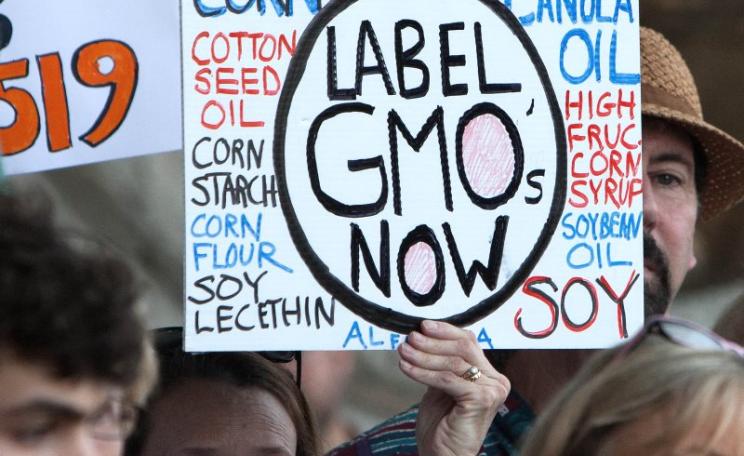Hidden GMOs have crept into the UK food chain. Supermarkets sell US imports of GMO food - mostly 'junk' like sweets, salad dressings, spreads, biscuits and cereals. And how many of us know that 80% of the meat we eat is fed on GM animal feed?
The food chain. On the one hand it is a symbol of global efficiency. It is truly amazing that we can get so much food to so many on any given day.
But, as it grows larger, more complex and more competitive, it is also a place where things get lost, where information gets obscured or glossed over and key issues can get pushed aside.
One of those issues is genetically modified food.
If you are uncertain of what that means, you're not alone. Even if you have heard about biotechnology, genetic engineering or genetically modified organisms (GMOs), you may not know much about them, or about where they fit in the sustainable food and provenance debates.
In this respect, in Europe, we are a little behind the rest of the world. In America, where the majority of GMOs are grown and eaten it is a hot topic, and chefs are at the forefront of the public debate.
In the weeks before the first US state-wide labelling law was voted on in California, Alice Waters managed to get around 1300 chefs to sign an open letter supporting the initiative. US chef Tom Colicchio has also been instrumental in organising chefs around the food labelling debate.
From test-tube and computer to plate
The biotechnology industry is inevitably hitting back, suggesting that chefs should positively embrace GMOs. So let's get the UK's chefs, restaurants, hotels, cafes and cafeterias talking about GMOs!
It's fair to say also that chefs and others in the food service industry generally feel that one way or another they can find the information they need about provenance to decide for themselves. But that's going to change as genetic engineering techniques are taken up more and more into the farming and food chain.
The internationally recognised definition of a GMO is something which is created in the lab using techniques that cannot occur in nature. This definition is being pushed to its absolute limits as new technologies for genetically engineering foods come on line.
One of these, synthetic biology (synbio) goes right to the heart of food provenance. Synbio is using DNA codes written on computers and printed on 3D bio printers to produce totally man-made versions of common ingredients such as vanilla, saffron, stevia, coconut and cocoa and a variety of other flavourings and fragrances.
You might argue that, if a GMO or synbio food product looks and tastes the same, what's the harm?
Yet there are identifiable, scientifically-documented differences, between GMOs and conventionally bred plants, in terms of the process, and in the genetic makeup of the end product.
Hidden GMOs have crept into the UK food chain. Supermarkets sell US imports of GMO food - mostly 'junk' like sweets, salad dressings, spreads, biscuits and cereals. And how many of us know that 80% of the meat we eat is fed on GM animal feed?
A recent well-publicised study showed, for instance, that a strain of GM maize widely consumed by humans and animals - was not only structurally different in term of certain proteins, but also contained higher levels of substances known to cause allergic reactions and to be carcinogenic.
GMO crops, apart from their 'man-made' aspect, also require higher levels of pesticides and have been shown to contain higher levels of pesticide residues. Some are actually bred to produce their own insecticides.
New questions
All these issues, and more, are likely to come to the fore as the UK government pushes forward with its plans to open up the UK's farms, fields and kitchens to GM technology.
Some aspects of Brexit - and a rediscovered relationship with an America aggressively determined to see its own interests prevail internationally - may help fast-track these plans.
There are currently ongoing field trials in the UK for GM camelina, wheat and potatoes. In the past year, dozens of new GMOs have been approved for food and feed at EU level. In the US, GMO salmon, potatoes and apples are on sale - and looking for new markets.
As these things happen, provenance takes on a new perspective and provokes new questions around authenticity: Is that tomato really a tomato if it has a gene from a fish in it? Is bread baked from wheat that has a gene from a cow in it suitable for vegetarians? Are those lamb cutlets the product of laboratory cloned sheep?
This is not science fiction; all of these products are in the pipeline, and as they come to market the conflicts and trade-offs facing the food service industry - and in particular those who care about provenance and who want to use authentic, environmentally and ethically sound ingredients - will increase.
Stirring the pot ...
Concern in Europe is already growing. In France, an open letter about GMOs and the corporate takeover of the food has been signed (so far) by 330 chefs, hoteliers, restaurateurs and others in the food industry. The letter was launched on gastronomy news website Atabula and initiated by its founder and editor, Franck Pinay-Rabaroust, a former editor of the Michelin Guide.
Hidden GMOs have crept into the UK food chain without many of us knowing it. In the UK, large supermarkets sell US imports of GMO food - mostly pre-prepared and 'junk' foods like sweets, salad dressings, spreads, biscuits and cereals. These products are at least labelled.
But due to lack of labelling how many of us know that 80% of the meat we eat is fed on GM animal feed? Many restaurants and fast food outlets are using GM oil - perhaps without even knowing it - and without knowing that they are breaking the law if they don't indicate this on the menu.
In a country where up to 70% of the public is against farming or eating GMOs, an acknowledgement on the menu is bound to throw up some interesting conversations, and PR - as pizza chain Domino's found when it admitted it was using GM ingredients in its pizzas. We all need to be ready to have those discussions.
Every good chef knows you need to stir the pot a little to keep things from sinking to the bottom and sticking there. That's why we've called our new initiative Stir the Pot. This year one of our priorities is to GMO conversation - one that so often sinks to the bottom of food chain discussions - to chefs, caterers, restaurateurs, hoteliers and others in the food service industry.
The food chain doesn't mean we need to be chained to old - and destructive or potentially unhealthy - ways of producing, sourcing or serving food. So let's get talking.
Join the conversation - please take a moment to fill in our survey on GMOs in restaurants and takeaways. Your answers will directly inform those discussions.
Pat Thomas is the founder / director of Beyond GM . She is an author, journalist and campaigner and a former editor of The Ecologist.
This article was originally published on Beyond GM.







